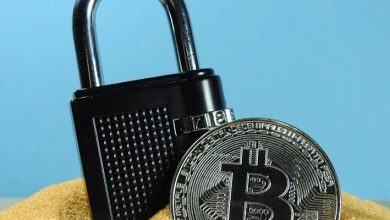Understanding the Risks of Public Wi-Fi for Crypto Transactions

- The dangers of using public Wi-Fi for cryptocurrency transactions
- How hackers exploit public Wi-Fi to steal your crypto assets
- Tips for staying safe when using public Wi-Fi for crypto transactions
- Why public Wi-Fi networks are a prime target for cyber attacks on cryptocurrencies
- The importance of encryption when conducting crypto transactions on public Wi-Fi
- Case studies of crypto thefts due to insecure public Wi-Fi connections
The dangers of using public Wi-Fi for cryptocurrency transactions
When it comes to cryptocurrency transactions, using public Wi-Fi can pose significant risks to your security and privacy. Public Wi-Fi networks are often unsecured, making it easier for hackers to intercept and steal sensitive information such as your crypto wallet details or private keys.
By connecting to public Wi-Fi for crypto transactions, you are essentially exposing yourself to potential attacks, including man-in-the-middle attacks, packet sniffing, and malware injections. These security threats can lead to unauthorized access to your funds and compromise the integrity of your transactions.
It is crucial to avoid conducting cryptocurrency transactions over public Wi-Fi networks to safeguard your assets and personal information. Instead, opt for secure and encrypted connections such as a virtual private network (VPN) or your mobile data network to ensure a safer and more private transaction experience.
How hackers exploit public Wi-Fi to steal your crypto assets
When you connect to a public Wi-Fi network, you are putting your crypto assets at risk of being stolen by hackers who exploit the vulnerabilities of these networks. Hackers can easily intercept your sensitive information, such as your private keys or passwords, while you are conducting crypto transactions over public Wi-Fi.
One common method hackers use is called a “Man-in-the-Middle” attack, where they intercept the communication between your device and the network. By doing so, they can steal your login credentials and gain access to your crypto wallets. Another technique is setting up fake Wi-Fi hotspots with names similar to legitimate ones, tricking users into connecting to them and unknowingly giving away their information.
It is crucial to be cautious when using public Wi-Fi for any crypto-related activities. Always use a virtual private network (VPN) to encrypt your connection and add an extra layer of security. Additionally, avoid accessing sensitive information or making transactions involving your crypto assets while connected to public Wi-Fi networks.
Tips for staying safe when using public Wi-Fi for crypto transactions
When using public Wi-Fi for crypto transactions, it is crucial to take extra precautions to ensure the security of your information and funds. Here are some tips to help you stay safe:
- Avoid accessing your crypto wallet or making transactions on public Wi-Fi networks whenever possible.
- If you must use public Wi-Fi, consider using a virtual private network (VPN) to encrypt your internet connection.
- Make sure your device’s security software is up to date to protect against malware and other cyber threats.
- Double-check the URL of the website you are using for crypto transactions to ensure it is secure (https://) and not a phishing site.
- Avoid saving your login credentials or other sensitive information on your device when using public Wi-Fi.
By following these tips, you can minimize the risks associated with using public Wi-Fi for crypto transactions and help protect your assets from potential security breaches.
Why public Wi-Fi networks are a prime target for cyber attacks on cryptocurrencies
Public Wi-Fi networks are often considered a prime target for cyber attacks on cryptocurrencies due to their inherent security vulnerabilities. These networks are typically unsecured, making it easier for hackers to intercept data transmitted between devices. When you connect to a public Wi-Fi network to conduct crypto transactions, you are essentially broadcasting your sensitive information to anyone else on the network who knows how to access it.
One common method used by hackers to steal cryptocurrency from users on public Wi-Fi networks is called a “man-in-the-middle” attack. In this type of attack, the hacker positions themselves between the user and the network, allowing them to intercept and manipulate the data being sent back and forth. This can give the hacker access to your crypto wallet information, private keys, and other sensitive data, putting your funds at risk of being stolen.
Another reason why public Wi-Fi networks are a popular target for cyber attacks on cryptocurrencies is the lack of encryption. Without proper encryption protocols in place, data transmitted over these networks is essentially sent in plain text, making it easy for hackers to read and exploit. This means that any information related to your crypto transactions, such as wallet addresses or transaction details, can be easily intercepted and used maliciously.
The importance of encryption when conducting crypto transactions on public Wi-Fi
Encryption plays a crucial role in ensuring the security of crypto transactions, especially when using public Wi-Fi networks. When conducting transactions over public Wi-Fi, there is a higher risk of interception by malicious actors who can potentially steal sensitive information such as private keys or login credentials.
By encrypting your data, you can significantly reduce the chances of unauthorized access to your crypto assets. Encryption converts your data into a code that can only be deciphered by someone with the corresponding decryption key. This means that even if your data is intercepted, it will be unreadable to anyone without the key.
Using encryption protocols such as SSL/TLS when connecting to public Wi-Fi networks adds an extra layer of security to your transactions. These protocols establish a secure connection between your device and the server, ensuring that any data exchanged between the two parties is encrypted and protected from eavesdropping.
In addition to encrypting your data, it is also important to use reputable crypto wallets and exchanges that have strong security measures in place. Look for platforms that offer two-factor authentication, biometric login options, and other security features to further safeguard your assets.
Overall, encryption is a critical component of maintaining the security and privacy of your crypto transactions, especially when using public Wi-Fi networks. By taking proactive measures to protect your data, you can minimize the risks associated with conducting transactions in potentially insecure environments.
Case studies of crypto thefts due to insecure public Wi-Fi connections
There have been several documented cases of crypto thefts resulting from using insecure public Wi-Fi connections. These incidents serve as cautionary tales for individuals engaging in cryptocurrency transactions while connected to public networks.
One such case involved a crypto investor who logged into their exchange account using a public Wi-Fi network at a coffee shop. Unfortunately, hackers were able to intercept the investor’s login credentials due to the lack of encryption on the public network. This resulted in the theft of a significant amount of cryptocurrency from the investor’s account.
In another instance, a trader fell victim to a man-in-the-middle attack while conducting a Bitcoin transaction over public Wi-Fi at an airport. The attacker was able to intercept the transaction details and reroute the funds to their own wallet, leaving the trader at a loss.
These case studies highlight the real risks associated with conducting crypto transactions over insecure public Wi-Fi connections. It is essential for individuals to prioritize their security by utilizing virtual private networks (VPNs) or mobile data connections when engaging in cryptocurrency activities outside of secure, private networks.



